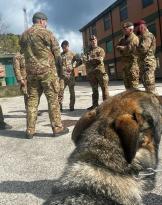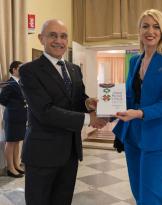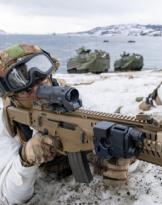The 25th ended combat medicine course (25th CMC) organized by the "Caorle" schools battalion of the marine brigade Saint Mark in which 26 nurses and 5 doctors from the Navy took part.
This training course was born in 1998 and was the first "Combat Casualty Care" course in Italy. Attendees were trained from both a theoretical and practical point of view in the application of the protocols of tactical combat casualty care (TCCC), i.e. that part of combat medicine that concerns the pre-hospital care provided to a wounded person in a tactical combat situation.
The healthcare personnel took part in a training course including both an amphibious and a specialist medical part, making use of theoretical lessons and practical exercises.
Supported and guided by marine brigade personnel Saint Mark, they had the opportunity to use cutting-edge materials and equipment and to apply specialized diagnostic procedures in the field.
The activity was supported by experts from different specialties, from radiodiagnostics in emergency settings, to hyperbaric medicine, from forensic medicine oriented towards ballistic injuries, to psychology in the military and operational context.
 The last week of the course took place in the marine brigade training area Saint Mark of Massafra (TA), allowing doctors and nurses to carry out "in the field" simulations with a high level of realism (through masking), aimed at understanding the importance of teamwork for the optimal management of staff in critical situations.
The last week of the course took place in the marine brigade training area Saint Mark of Massafra (TA), allowing doctors and nurses to carry out "in the field" simulations with a high level of realism (through masking), aimed at understanding the importance of teamwork for the optimal management of staff in critical situations.
The course concluded with a simulation of operational activity and, in particular, after an initial phase of patrolling with the use of the skills learned during the amphibious training (tactical movement, defense from an external threat and CBRN attacks), the team he trained in the management of a major medical emergency, carrying out the triage and treatment of multiple injured people. The staff then trained in medical evacuation by helicopter of the most critical patients (MEDEVAC) and in more in-depth treatment at a advanced medical post (WFP).
Overall, this experience allowed the attendees to acquire fundamental skills for future employment in the operational field, allowing them to grow from both a professional and human point of view.















